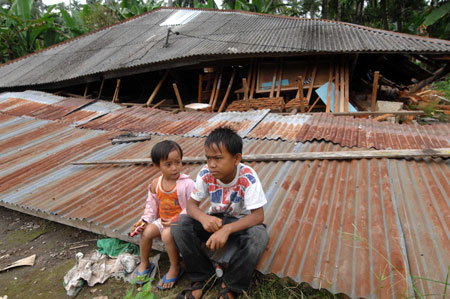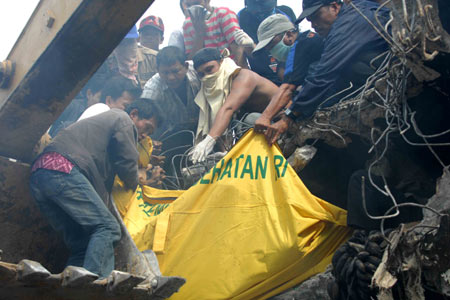Aid flood into Indonesia's quake-hit areas
Aids from domestic donators and foreign countries have flooded in to West Sumatra province of Indonesia after a 7.6-magnitude quake hit the area on Wednesday, leaving thousands of people homeless and infrastructure damaged.
The quake also leveled more than 22,000 buildings and damaged over 16,000 others.
|
|
|
Two children sit in front of a collapsed house in Pariman, West Sumatra of Indonesia, Oct. 3, 2009. [Xinhua/Yue Yuewei] |
It is predicted more than 1,000 people have been killed by the catastrophe. Thousands of people now live in simple makeshift buildings.
Foreign aids in the form of human forces, some equipment and medicine, and domestic assistance such as foods, medicine and tents, have already arrived in the province, officials said on Saturday.
Earlier, the Indonesian government has said that the country did not really need logistic assistance from foreign countries.
The countries which have sent their aids include Japan, Australia, China's Hong Kong, Switzerland, the United States, the United Kingdom, France, Singapore, Germany, South Korea and Malaysia.
The United Nations, the European Commission, foreign non-governmental organizations have also provided assistance, according to information from the United Nations.
Food, medicine, tents and financial assistance have poured in the province, but they seem to have been distributed up to district administration level and have not reached the survivors.
|
|
|
Rescuers carry a victim's body in the Sumatran city of Padang, Indonesia, on Oct. 2, 2009. 1,100 people were killed in a powerful earthquake Wednesday evening and the number could rise to thousands as many people were still trapped in the debris. [Xinhua/Yue Yuewei] |
Coordinator of the provincial aids distribution Abdul Gafar told Xinhua that the distribution of the aids was fast, but he could not confirm whether the quake survivors had received the materials.
"We distributed the materials in the afternoon, hours after we received them in the morning," he said.
Indonesian military has been ready to help distribute the aids should it face difficulty, the country's Army Chief of Staff Agus Sasongko said.
"The aid distribution which could not pass through land transport will be helped by army with helicopters," he said.
Sasongko said that the military would involve in the relief works up to two months.
The quake survivors hoped they could receive more help since they suffer injuries and their houses have been completely destroyed in the disaster.
Yulimar, 50, one of the survivors, lost a daughter and she was receiving treatment in hospital.
"I really hope for financial aids from the government to help pay my medical bills," she said.
She said her younger sister in a village expected the government could help to rebuild her house which collapsed in the quake.
Yulimar said that the victims in the village have not received any aids yet from the government, but only from relatives.
 0
0 









Comments